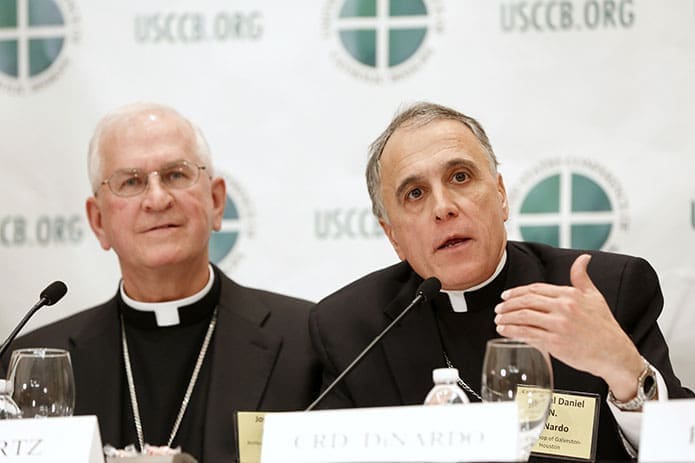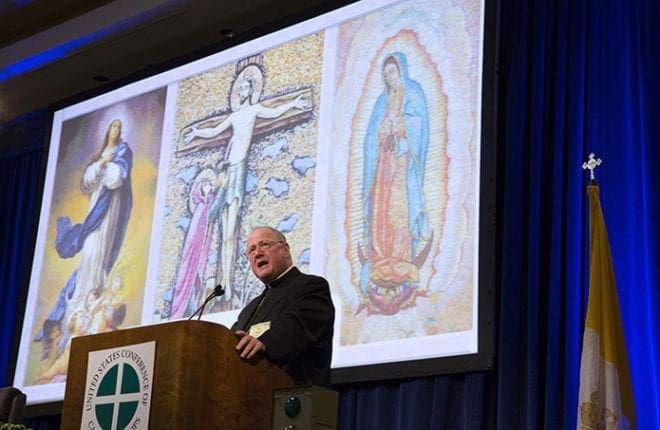 CNS photo/Nancy Phelan Wiechec
CNS photo/Nancy Phelan WiechecBaltimore
Bishops elect new leaders, approve liturgical texts, discuss relief aid
Published November 22, 2013
BALTIMORE (CNS)—The U.S. bishops at their fall general assembly in Baltimore elected new leaders, discussed taking a second collection in their dioceses for typhoon relief in the Philippines, reviewed efforts to defend traditional marriage and religious liberty, and approved development of a statement on the dangers of pornography.
They also passed a number of liturgical items, including the use of a Mexican translation of the Roman Missal, and OK’d a budget for 2014 and a 3 percent increase in the diocesan assessment for 2015.
The actions came during the first two days of their Nov. 11-14 meeting. The bishops were to meet behind closed doors in executive session Nov. 13 and 14.
On Nov. 12, the bishops by a wide margin elected Archbishop Joseph E. Kurtz of Louisville, Ky., to succeed New York Cardinal Timothy M. Dolan as president of the U.S. Conference of Catholic Bishops. The archbishop had been USCCB vice president. Cardinal Daniel N. DiNardo of Galveston-Houston was elected vice president.
Both prelates were to begin their three-year terms at the conclusion of the USCCB meeting.
In an interview with Catholic News Service shortly after his election, Archbishop Kurtz spoke of seeing the example of Pope Francis as a model for outreach, listening and collegiality.
“He’s asking us to go beyond what we’ve been doing,” he said.
Cardinal DiNardo had been set to begin a three-year term as chairman of the Committee on Divine Worship, but he had to vacate that seat when he was elected vice president. The bishops in a 114-112 vote elected Bishop Arthur J. Serratelli of Paterson, N.J., to fill the spot over Archbishop Allen H. Vigneron of Detroit.
The bishops Nov. 12 approved the development of a pastoral statement on the dangers pornography poses to family life that would serve as a teaching tool for church leaders. The Committee on Laity, Marriage, Family Life and Youth will develop the statement, providing a draft to the bishops in 2015.
“The more pornography spreads, the more violent and debased it becomes and the more it exploits the men and women who are part of the industry,” explained Bishop Richard J. Malone of Buffalo, N.Y., incoming chair of the committee.
Also on Day Two, the bishops nearly unanimously approved several steps toward adapting the Mexican Misal Romano for use in the U.S. The Mexican translation of the missal will have Mass propers for the U.S. calendar included, with publication possible as soon as fall of 2015.
The bishops also approved adaptations for the Order of Celebrating Marriage and OK’d a new translation of the Order of Confirmation for use in U.S. dioceses.

New York Cardinal Timothy M. Dolan, outgoing president of the U.S. Conference of Catholic Bishops, addresses the annual fall meeting of the bishops Nov. 11 in Baltimore. CNS photo/Nancy Phelan Wiechec
In his final address Nov. 11 as USCCB president, Cardinal Dolan stressed the importance of protecting religious freedom around the world and outlined action steps the bishops could take on the issue.
He urged the bishops to create an awareness of “today’s new martyrs” persecuted for their beliefs by writing and talking about the issue in diocesan newspapers, blogs, speeches and pastoral letters. He also said the bishops should contact their political leaders and urge them to make the protection of “at-risk Christians a foreign policy priority.”
Archbishop Carlo Maria Vigano, apostolic nuncio to the United States, reflected on Pope Francis’ call to have a church built on Christ’s love.
“The Holy Father wants bishops in tune with their people,” he said. When he met with the pope this summer, he noted, the pontiff made “a special point of saying that he wants pastoral bishops, not bishops who profess or follow a particular ideology.”
The same day the chairman of the U.S. bishops’ Subcommittee on the Promotion and Defense of Marriage said the legal defense of marriage is “at a critical point in this country.”
Archbishop Salvatore J. Cordileone of San Francisco discussed the Supreme Court’s ruling that rendered the federal Defense of Marriage Act unconstitutional and Senate passage Nov. 7 of the Employment Non-Discrimination Act.
He said the DOMA decision is being used to judicially challenge marriage laws in more than a dozen states. He also noted that “ENDA-like laws have contributed to the erosion and redefinition of marriage at the state level.”
The bishops voted to extend through 2016 a “Call to Prayer for Life, Marriage and Religious Freedom,” originally intended to coincide with the Year of Faith, which began October 2012 and will end Nov. 24.
A report on the work of Catholic Relief Services highlighted what the agency is doing for survivors of Super Typhoon Haiyan.
The agency has already committed $20 million in emergency aid, with the funds expected to come from a second collection the agency asked U.S. bishops to undertake in their dioceses before the end of the year. Bishop Gerald F. Kicanas of Tucson, Ariz., chairman of the CRS board, said the collection could be taken in dioceses the weekends of Nov. 16-17 or Nov. 30-Dec. 1.
Bishop Kicanas said it was expected that some funds will be set aside for the reconstruction of Catholic churches, schools and agencies, but the immediate need was for relief efforts.
In a Nov. 12 letter to Archbishop Jose S. Palma of Cebu, president of the bishops’ conference of the Philippines, Cardinal Dolan said: “Together with the Catholic faithful throughout this country, we assure you of our prayers for the victims of this disaster and for the survivors as they struggle to rebuild their lives.”
The cardinal also confirmed the U.S. bishops will also take up a special collection in U.S. dioceses to aid in relief efforts.
In other action, the bishops approved a budget for next year and approved a 3 percent increase in diocesan assessments starting in 2015.
In a report on the U.S. bishops’ priorities for 2013-16, Archbishop J. Peter Sartain of Seattle, chairman of that committee, said the bishops continued to “make important progress” in their efforts to protect the life and dignity of the human person, to strengthen marriage and family life, to promote religious liberty, and to improve faith formation and sacramental practice.
Archbishop Sartain also asked the bishops—and they approved—to add a new staff person to the Secretariat of Pro-Life Activities to work on a national level with the post-abortion ministry Project Rachel. The position will be funded by a Knights of Columbus grant.
The U.S. bishops’ National Advisory Council, a 48-member group that meets in tandem with meetings of the bishops’ Administrative Committee, gave “strong agreement” to the major items on the bishops’ agenda for the fall meeting and added a few more items, including a request the bishops make a concerted effort to make Catholic education more available to underserved populations.”
The council also suggested the bishops review the federal government’s Common Core State Standards initiative and consider a recommendation for mentoring and training programs for newly ordained priests.
The bishops elected three new members of the Catholic Relief Services board: Bishops William P. Callahan of La Crosse, Wis., Frank J. Dewane of Venice, Fla., and Cirilo B. Flores of San Diego. They also elected Bishop Richard J. Garcia of Monterey, Calif., and Miami Archbishop Thomas G. Wenski to the board of the Catholic Legal Immigration Network, better known as CLINIC.
Contributing to this report were Mark Pattison, Patricia Zapor and Dennis Sadowski in Baltimore and Carol Zimmermann in Washington.